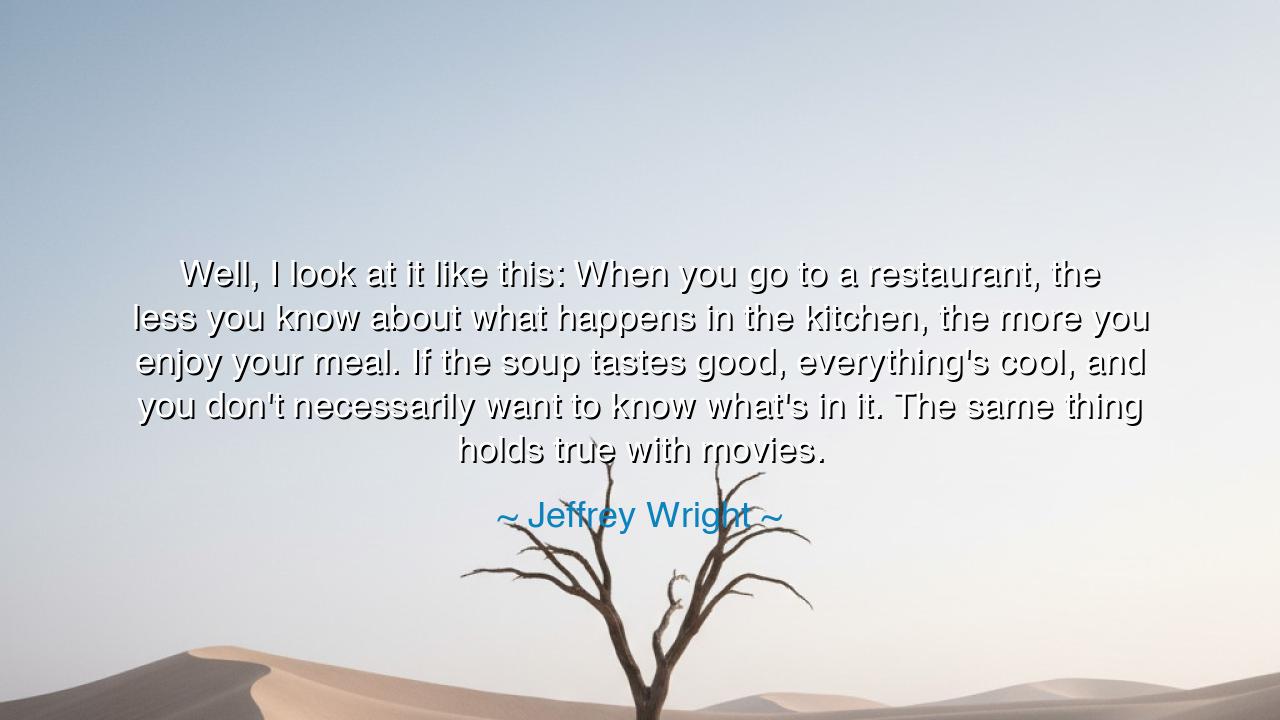
Well, I look at it like this: When you go to a restaurant, the
Well, I look at it like this: When you go to a restaurant, the less you know about what happens in the kitchen, the more you enjoy your meal. If the soup tastes good, everything's cool, and you don't necessarily want to know what's in it. The same thing holds true with movies.






In the ancient world, there was a deep understanding that some things are best left hidden, for in the mystery lies the joy of discovery. The greatest artists, philosophers, and storytellers knew that life itself is not always about understanding every detail, but about immersing oneself in the experience. In the words of Jeffrey Wright, we hear this same sentiment applied to the world of movies: “Well, I look at it like this: When you go to a restaurant, the less you know about what happens in the kitchen, the more you enjoy your meal. If the soup tastes good, everything’s cool, and you don’t necessarily want to know what’s in it. The same thing holds true with movies.” Wright’s analogy draws on the ancient wisdom that mystery and surprise are often what make experiences rich and memorable.
This wisdom is as old as time itself. The ancients understood that to experience something fully, one must be immersed in it without constantly analyzing its parts. Think of the Greek theater, where audiences did not want to know the intricate details of the actors' preparations or the mechanics behind the performance—they wanted to feel the emotion, experience the drama, and be swept away by the performance. In the same way, a meal is best enjoyed when the diner focuses on the flavors and the pleasure of eating, rather than questioning the intricacies of how the dish came to be. Wright’s insight taps into this same idea: sometimes, the magic of an experience lies in its mystery, and in our ability to simply be present.
Consider the great artists of the Renaissance, like Leonardo da Vinci, who created masterpieces that left their audiences in awe and wonder. They did not reveal every detail of their process to the public, for they understood that the mystery of their craft added to its power. The creation of a work of art is often more magical when it remains veiled, allowing the viewer or the consumer to fill in the gaps with their own imagination. Wright’s words, in this context, remind us that the beauty of cinema, like art, is often in its ability to transport us, to create something so immersive that we are lost in the experience without worrying about the details behind the scenes.
Similarly, the ancient philosophers often spoke of the importance of living in the moment, of fully engaging with life without always trying to dissect or understand every nuance. The great Stoic philosopher Epictetus taught that the secret to a peaceful life is to focus on the things within our control and to accept the mystery of the world beyond our reach. In the same way, Wright’s analogy suggests that the joy of a movie, or of life itself, often comes when we suspend our judgment and let the experience unfold without overanalyzing the mechanics behind it.
The lesson here is profound: life is often richer when we embrace the unknown and allow ourselves to enjoy experiences without the need to understand every detail. In our fast-paced, information-driven world, it’s easy to become obsessed with the how and why of everything—whether it's how a meal was made or how a film was produced. But true enjoyment often comes from letting go of the need to control or analyze every moment, and instead, fully immersing ourselves in the experience itself. Wright’s words remind us that we can experience life deeply without constantly pulling back the curtain to see how the magic is made.
In your own life, take a moment to consider what you might enjoy more if you let go of the need for complete understanding. What if, instead of trying to uncover every secret, you allowed yourself to simply be present in the experience? Whether it's a movie, a meal, or a moment in nature, embrace the mystery and joy of the experience. Just as the ancients understood, sometimes the greatest reward lies not in knowing everything, but in simply being present and open to the experience unfolding before you.
Let this wisdom guide you: sometimes, the most meaningful moments are those we don’t overthink. Whether in the pleasure of a meal or the beauty of art, the enjoyment lies in the experience itself. Don’t be afraid to embrace the unknown, to step into life with the wonder and awe of a child, and to celebrate the moments of mystery that make life so rich and vibrant. The world is full of beauty, and it is through embracing the unknown that we are able to fully appreciate it.






AAdministratorAdministrator
Welcome, honored guests. Please leave a comment, we will respond soon